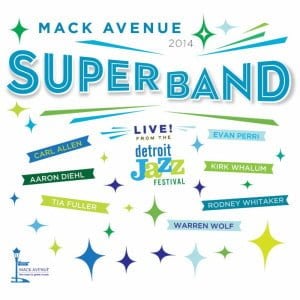 Eagerly defying genre boundaries with a fresh, inventive electro-acoustic sound, trioKAIT is a piano trio for a random-access generation. On their self-titled debut, the funky and eclectic Los Angeles-based trio — pianist Kait Dunton, electric bassist Cooper Appelt, and drummer Jake Reed — shuffles wide-ranging influences and Dunton’s unconventional compositions into a refreshingly modern take on instrumental music that is as uncategorizable as it is infectious.
Eagerly defying genre boundaries with a fresh, inventive electro-acoustic sound, trioKAIT is a piano trio for a random-access generation. On their self-titled debut, the funky and eclectic Los Angeles-based trio — pianist Kait Dunton, electric bassist Cooper Appelt, and drummer Jake Reed — shuffles wide-ranging influences and Dunton’s unconventional compositions into a refreshingly modern take on instrumental music that is as uncategorizable as it is infectious.
On their first recording together, trioKAIT shows off a cohesive group sound and an electrifying camaraderie that takes most bands years to develop. A former member of the extended clan of Brooklyn-based fusionistas Snarky Puppy, Dunton refers to trioKAIT as a “family band,” a spirit that shines through in their playful and spontaneous interactions. Knowing her bandmates as well as she does — Appelt was a classmate of the pianist in the renowned jazz program at the University of North Texas; Reed was a classmate at USC — Dunton composes music that takes full advantage of their individual strengths and collective identity to forge an utterly singular sound.
Though Dunton’s fingers never stray from the keyboard of her acoustic piano, there are echoes of electronic music throughout her writing for trioKAIT. EDM, classic R&B, various transmutations of electronica, and modern rock music all intermingle with jazz and classical influences on the album, reflective of Dunton’s out-of-the-box tastes and interests. Her compositional focus is on storytelling rather than soloing, the emotional rather than the cerebral.
Growing up in Los Angeles, Dunton was obsessed with the piano, she says, “from the time I was old enough to reach the keys.” But with no models for a career in music, she thought of her passion as a hobby until she was encouraged to pursue it further by teachers at the University of Virginia, where she was majoring in Spanish. They helped her to put together a last-minute tape to apply to the University of North Texas.
Immediately upon arriving in the Lone Star state, Dunton made two life-changing encounters. Among the first musicians she played with were Ross Pederson, now an in-demand drummer with a stunning variety of artists, and Michael League, founder of Snarky Puppy. “I’d never played with people like that,” Dunton says in a news release. “It completely blew my mind. I learned a lot really fast.”
In 2009, Dunton released her debut album, Real & Imagined, which featured Pederson on drums and Daniel Foose on bass. She returned home to earn her Doctor of Musical Arts degree from the University of Southern California Thornton School of Music, where she studied under pianist Alan Pasqua and composer Vince Mendoza. While there, she recorded her second release, Mountain Suite, with heavy-hitters from the USC faculty, including Peter Erskine on drums, Bob Mintzer on tenor sax, John Daversa on trumpet and Darek Oles on bass.
In Appelt and Reed, Dunton has found collaborators who are as open-eared and adventurous as she is. Both instrumentalists are active in a variety of scenes in L.A., playing big band jazz, rock, R&B, and funk music. As trioKAIT, they’ve made three tours of Germany and presented a preview of the new album at the USC Women’s Conference last March. The trio’s growing success is proving writer Don Heckman’s assessment of Dunton as “an extraordinary talent on the rise” as well as her recognition by Jazz.com as one of “10 Future Female Jazz Stars.”




